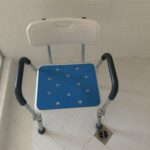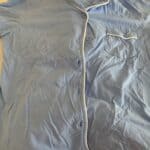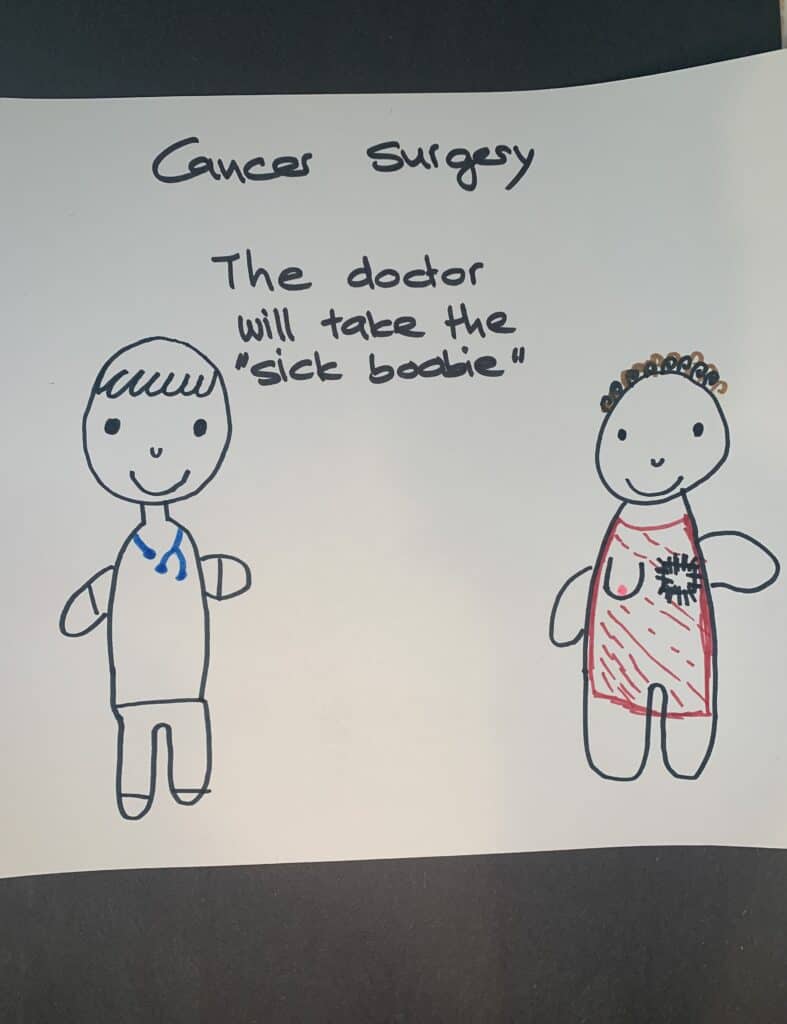How to Navigate a Mastectomy as a Mother of young kids : 6 Tips
After diagnosis, things often move quickly. Surgery might come first, or treatment could start with something like chemotherapy. Facing major surgery and possibly losing one or both breasts can be terrifying. Your breast surgeon will determine if you need a lumpectomy or a mastectomy based on your tumor and breast size. You may or may not have a choice. You’ll also meet with a plastic surgeon to discuss reconstruction, which is often part of the initial surgery. Check out the “Reconstruction” section for more details. It can be overwhelming to rush between doctor appointments and make life-altering decisions rapidly. I felt sad, mad, and anxious. How can you emotionally and physically prepare for surgery? Having undergone a mastectomy twice, I want to support your decision-making process by sharing what I wish I had known, including helpful products, tips for organizing family care, and information about reconstruction options that might not be fully presented to you.
Here are 6 essential tips to help you prepare for your journey:
Tips how to prepare for your Surgery
1. Get a second opinion at a Research Hospital
Even if you have already started treatment, it is not too late to seek out a second opinion.
Seeking a second opinion from a research hospital is crucial, despite feeling pressure to act quickly. These hospitals specialize in treating cancer, offering cutting-edge treatments and specialized plans. They see thousands of cancer patients monthly, providing the best information and survival rates. Local hospitals may lack this expertise, increasing the risk of misdiagnosis, which occurs in around 40% of cases.
Concerned about cost? Research hospitals often offer better financial assistance. Organizations like DoCancer or the HammerasGroup can help offset expenses for a second opinion.
Even if you’ve started treatment, it’s not too late to seek another opinion. This decision is vital for your health, so take the time to make an informed choice.

2. Research ALL of your Reconstruction options

When diagnosed, cancer removal is the primary focus, but also consider the possible reconstruction options.
- Consult your care team to explore and discuss all options, including advantages and disadvantages. You may not have a choice between a lumpectomy and a mastectomy, but there is almost always a choice between implant and tissue reconstruction.
- For more details, read my guide under reconstruction here and watch my video about my decision-making process here.
My first surgery was a single mastectomy with an expander. My second surgery involved bilateral mastectomy and reconstruction with my own tissue, which I explain in more detail in here.
3. Organize care
Depending on the reconstruction type you choose your surgery and recovery will be lengthier. In general, with a flap procedure (reconstruction with your own tissue) your recovery time will be longer compared to an implant based reconstruction. Your recovery time will be the shortest with no reconstruction at all.
- Let people know what you are going through and ask help. You will surprised how people in your community will rally to help a family in need. Sometimes even people I barely knew. Often people said, “let me know if you need anything”. But, then how do you coordinate care without burning out certain people? Also, how do you coordinate for all the help you need?
- CaringBridge and a Mealtrain are great tools to organize help during your recovery. You can easily ask for the kind of help you need on a certain day, whether it is a a ride, taking your kids to daycare or anything else.
- Consider setting up a personal fundraiser to lighten the financial burden. Gofundme makes it easy.
- Plan for the worst and simply hope for the best!
KIDS: For younger kids, you’ll need practical help. Enroll preschoolers in full-time care if possible, or get help from friends and family. Check out my Resource section here to help with costs during intense treatment times.
For school-aged kids, arrange transportation to/from school and activities. Set up playdates outside your home to give yourself time to rest and keep normalcy for your kids.
HOUSEHOLD: You won’t be able to lift more than 5lbs for a while.
Ask friends, neighbors, or family to run errands and pick up groceries. Consider grocery deliveries. Have someone prepare meals or use a meal delivery service like Pink Ribbon Good , which provides free meals for cancer patients for up to 12 weeks.
Get help with cleaning or hire a cleaner if you can afford it. Organizations like Cleaning for a Reason. offer free cleaning services for cancer patients. Pink Ribbon Good also provides lightweight vacuums and cleaning products from Branch Basics.
YOURSELF: After surgery, you’ll need a caregiver to help with drains, showers, and washing your hair.
Everybody is different, but you will require the utmost care during the first two weeks after your mastectomy. The more complex your surgery, the longer you may need assistance. For my flap surgery, I required the most help during the first four weeks. If you want to read more about my Flap reconstruction surgery experience, click here.

4. Prepare for Surgery Day
I only recommend products I personally used for my recovery. If you buy through my blog’s Amazon affiliate link, I may earn a commission at no extra cost to you.
- Prep your home before surgery
- Before surgery, move items within easy reach to stay independent. After surgery, you’ll have drains (duration depends on the type of reconstruction and your drain output) and can’t lift your arms overhead. Lower items from high shelves and test your setup, or ask your caregiver for help.
- You’ll need to sleep on your back with an elevated upper body to promote healing. Consider sleeping in a recliner or using a wedge pillow and additional pillows for comfort.
- After a Double Mastectomy wiping your bottom can be hard, consider getting a bidet or a bidet attachment.
- For the first few days after surgery you may feel weak. Consider getting a shower chair.
- Having a detachable showerhead handheld made showering a lot easier.
- Don’t forget to get a anti-slip mat for your shower.







- What to bring to the hospital
- Bring some easy slip on shoes
- soft easy slip on PJ or yoga pants
- a button down shirt and/or robe with drain pockets
- A mastectomy pillow for the car ride home, which I afterwards used a lot for arm support.




- Useful products for your recovery
- You might find it difficult to move around freely, so choose clothes that you can step into easily. Get 2-3 soft front button-down tops, some comfortable button-down PJ’s and or robe that has drain pockets for your drains. It will make dressing and moving around a lot easier.
- To avoid dangling drains while showering, I also recommend a drain holder pouch to put your drains in.
- Depending on where you get your surgery, you may not be advised to take a full shower until after your drains are out. Some dry shampoo will be coming in handy.
- A portable inflatable rinse basin portable inflatable rinse basin can help you wash your hair over a sink.
- Have some lozenges on hand for a sore throat after surgery.







- Read my post on how to cope emotionally and physically by clicking the button below
5. Tell your children
One of the hardest things I had to do was telling my children that I had cancer. My kids were 3, 5, and 7 at the time. I wanted to honest but I didn’t want to to create anxiety or making them feel guilty about my cancer diagnosis. Simply put, giving kids information about your new cancer is tough. Young children might not understand the difference between cancer and other sicknesses, like colds. However, there are some things you can do to help them understand:
- Use language they can understand, and keep explanations simple. For example, you could say, “My breast has a lump and is sick, and my doctors will take my breast, so I can feel better.” It’s important to remind children that it’s no-one’s fault that you have cancer. To help them cope, let them talk about cancer on their own terms and in their own time.
- Short conversations and making some simple drawings will help kids process the information better.
- Playing with young children can help them express their feelings.
- Let them know that their routine may change, but that Mommy still loves them. For all of my children, it was important to understand that mommy may not be able to play catch or take them to the playground like we usually did, but that Mommy instead could read them more books or do some crafts with them.
- Involve their school/teachers, so they know what is going on with your child and can help them process their emotions. Find out if your school has a program to offer support for your children during that difficult time.
- Check out this guide from the cancer support community about how to talk about cancer to your children.
- Reach out to the organization Bright Spot Network. They offer support groups, free kids’ books, and resources for parents of young kids battling cancer. Check also the section Resources for some of my favorite children’s books and videos.


6. Go in with a positive mindset

- Reframe your thoughts, simply by changing the way you look at Surgery. Instead of being mad, angry and sad that that you will be loosing your breast, focus on the fact how surgery will remove cancer from your body.
- Connect with other survivors. Knowing what you can expect physically and emotionally can put you at ease.
- Mindfulness Practices, such as starting a gratitude journal, meditations, breathwork or using positive affirmations and mantras can be very helpful.
- Consider reaching out to a therapist that can help you with being able to go in with a positive mindset. Hypnotherapy may be another very powerful way to achieve that. Don’t hesitate to reach out to the organization DoCancer. They will be able to connect you with a therapist or a hypnotherapist. I had great success to prepare for my flap surgery with Breathwork and Hypnotherapy.
- Check out the section “How to cope emotionally and physically after a Mastectomy.” here
Join Our Community
If you found this guide helpful, please share it with others who might benefit. For more detailed information, personal stories, and expert advice, subscribe to my newsletter [Subscribe Now].
Follow Me on Instagram
For weekly inspiration, tips, and updates, connect with me here!
Thank you for being a part of our community.

